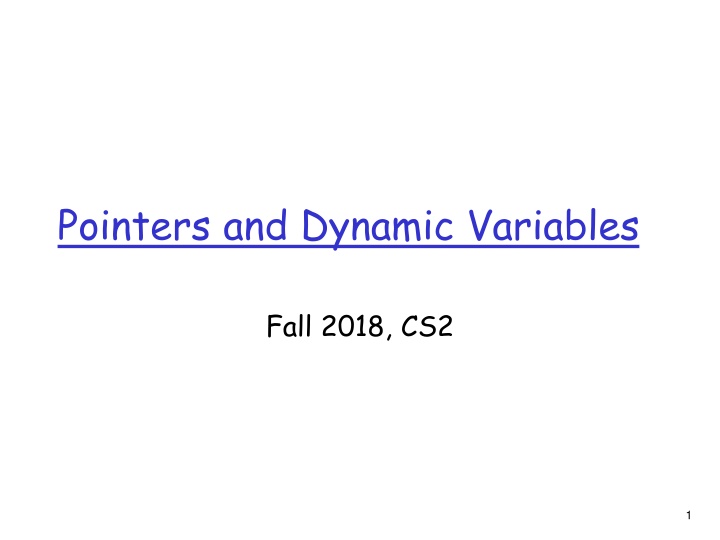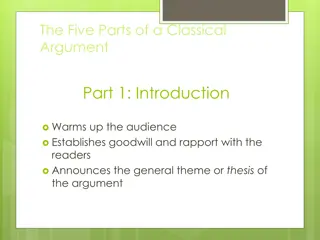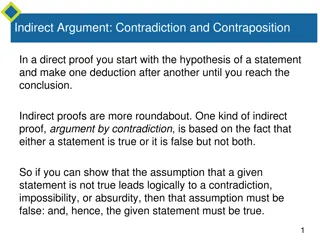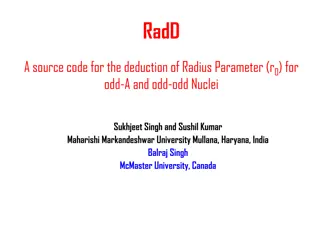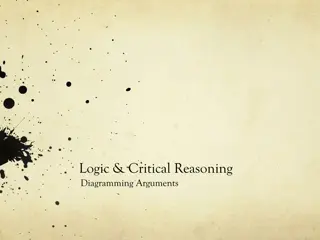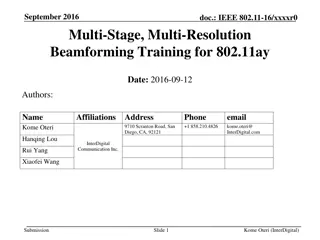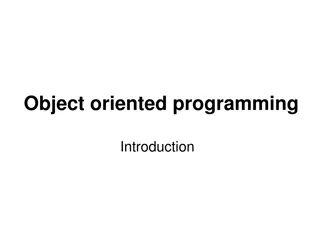Template Argument Deduction in C++: Multi-Paradigm Programming
This content discusses template argument deduction in C++, covering template type parameter conversions, function template explicit arguments, trailing returns and type transformation, as well as function pointers and references.
Download Presentation

Please find below an Image/Link to download the presentation.
The content on the website is provided AS IS for your information and personal use only. It may not be sold, licensed, or shared on other websites without obtaining consent from the author.If you encounter any issues during the download, it is possible that the publisher has removed the file from their server.
You are allowed to download the files provided on this website for personal or commercial use, subject to the condition that they are used lawfully. All files are the property of their respective owners.
The content on the website is provided AS IS for your information and personal use only. It may not be sold, licensed, or shared on other websites without obtaining consent from the author.
E N D
Presentation Transcript
Pointers and Dynamic Variables Fall 2018, CS2 1
Data, memory memory address: every byte is identified by a numeric address in the memory. a data value requiring multiple bytes are stored consecutively in memory cells and identified by the address of the first byte In program we can: find amount of memory (num. of bytes) assigned to a variable or a data type: sizeof(int), sizeof x find the address of a variable: &x 2
Example int x, y; int takes 4 bytes address of x is the address of its first byte 1000 x 1004 y 3
Pointers Variables (or Pointers) Pointer variables: a variable that stores memory address (of another variable) is used to tell where a variable is stored in memory Pointers "point" to a variable Memory addresses can be used to access variables Array variable actually stores address of the first element in array int a[10]; cout <<a<<endl; cout <<&(a[0])<<endl; When a variable is used as a call-by-reference argument, its address is passed 4
Declaring Pointers Pointer variables must be declared to have a pointer type Ex: To declare a pointer variable p that can "point" to a variable of type double: double *p; The asterisk identifies p as a pointer variable
Declaring pointer variables DataType * pointerVariable; //declare a pointerVariable that can be used to point to DataType variable int * p; char *cptr; DayOfYear * pDate; //pDate is a pointer pointing to DayOfYear obj double *q; //no space between * and variable name Like other variables, before initialization, p and cptr might contain some arbitrary value So, important to initialize: int *p=NULL; // assign NULL constant to p, a pointer variable to indicate // that p does not point to any valid data // internally, NULL is value 0. Common pitfall: int *p1, *p2; //p1,p2 are both pointers that point to int int *p1, p2; //p1 is pointer, but p2 is int //* only applies to the variable that follows it, p1; not p2 6
pointer to different types DataType * pointerVariable; //declare a pointerVariable that can be used to point to DataType variable int * p=NULL; char *cptr=NULL; DayOfYear * pDate=NULL; //pDate is a pointer pointing to DayOfYear obj double *q=NULL; //no space between * and variable name Pointers to different types have same size, sizeof(int *)==sizeof(double *) //8 why differentiate them? int and double, char, takes different number of bytes, and interpret data differently 7
address of Operator &variable: yield the address of a variable can then be assigned to a pointer variable int v1; int * p1; p1 = &v1; // assign address of v1 to p1 //p1 is now a pointer (pointing) to v1 int a[10]; assert (a==&(a[0])); //array variable itself stores address
Example int x, y; int *p1, *p2; name address 1000 x address of x: 140724463361388 address of y: 140724463361384 address of p1:140724463361376 address of p2:140724463361368 1004 y 1008 p1 address of x0x7ffcbf8f5a8c address of y0x7ffcbf8f5a88 address of p10x7ffcbf8f5a80 address of p20x7ffcbf8f5a78 p2 1012 9
Typical layout of a program in memory local variables Global variables static variables 10
.. int a() { b(); c(); return 0; } Stack and StackFrame int b() { return 0; } int c() { return 0; } int main() { a(); return 0; } 11
Example int x, y; int *p1, *p2; x=-42; y=163; -42 1000 x 163 1004 y 1008 p1 1012 p2 12
Example int x, y; int *p1, *p2; x=-42; y=163; p1=&x; p2=&y; -42 1000 x 163 1004 y 1000 1008 p1 1004 1012 p2 13
dereferencing Operator *pointerVariable: the variable that pointerVariable points to Here the * is dereferencing operator, pointerVariable is said to be dereferenced int v1; int *p1; //this * means p1 is a pointer p1 = &v1; // assign address of v1 to p1 cout << *p1; //display the int that p1 points to, i.e, v1 Pitfall/reminder: the context is important! * used between type and name vs. * before a pointer variable
Example int x, y; int *p1, *p2; x=-42; y=163; p1=&x; p2=&y; -42 1000 x 163 1004 y 1000 1008 p1 1004 1012 p2 *p1=17; 17 1000 x //*p1 is another name of for x 163 1004 y 1000 1008 p1 1004 1012 p2 15
Fundamental pointer operations & address-of a variable. Its operand is a variable. example: int *p; int a=10; p=&a; * variable that a pointer is pointed to. Its operand is a pointer. example: *p=5; they are used to move back and forth between variables and pointers to those variables. int *p; *p=5; //the variable pointed to by aptr has to be valid int *p=NULL; <=> int *p; p=NULL; 16
example int x, y; int *p1, *p2; x=-42; y=163; p1=&x; p2=&y; *p1=17; /* another name of for x*/ 17 1000 x 163 1004 y 1000 1008 p1 1004 1012 p2 p1=p2; /* pointer assignment, now two pointers point to the same location*/ 17 1000 x 163 1004 y 1004 1008 p1 1004 1012 p2 18
example int x, y; int *p1, *p2; x=-42; y=163; p1=&x; p2=&y; *p1=17; /* another name of for x*/ 17 1000 x 163 1004 y 1000 1008 p1 1004 1012 p2 *p1=*p2; /*value assignment*/ 163 1000 x //think of *p1 as another name of the variable p1 points to. 163 1004 y 1000 1008 p1 1004 1012 p2 19
Usage of pointers Allow one to refer to a large data structure in a compact way. Each pointer (or memory address) typically fits in four bytes of memory! Array: static or dynamic arrays Different parts of a program can share same data: passing parameters by reference (passing address between different functions), or by pointers One can reserve new memory in a running program: dynamic memory allocation Build complicated data structures by linking different data items 20
Passing parameters by reference using pointers Suppose we want to set x (defined in main() function) to zero, compare the following code: /*pass by value*/ void SetToZero1 (int var) { var=0; } /*pass by pointer*/ void SetToZero2(int *ip) { *ip=0; } int main() { int x=163; SetToZero1(x) SetToZero2 (&x); } 21
int main () { x=163; SetToZero(x); } stack frame for main() in our computer s memory 163 1000 x 1004 1008 1012 163 1208 var stack frame for SetToZero1( ) in our computer s memory void SetToZero (int var) { var=0; } 1212 22
int main () { x=163; SetToZero(x); } 163 1000 x 1004 stack frame 1008 1012 0 1208 var void SetToZero (int var) { var=0; } stack frame 1212 23
163 1000 x int main () { x=163; SetToZero2(&x); } 1004 stack frame of main() 1008 1012 1000 1208 ip stack frame of SetToZero2 void SetToZero2(int *ip) { *ip=0; } 1212 24
0 1000 x int main () { x=163; SetToZero(&x); } 1004 stack frame 1008 1012 1000 1208 ip stack frame void SetToZero(int *ip) { *ip=0; } 1212 25
Passing parameters main stack frame SetToZero1 stack frame void SetToZero1 (int var) { var=0; } SetToZero(x); /* has no effect on x*/ SetToZero(x); var=x; var=0; void SetToZero2(int *ip) { *ip=0; } SetToZero2 stack frame stack frame SetToZero(&x); SetToZero2(&x); ip=&x;//ip points to x *ip=0; void SetToZero3 (int & var){ var = 0; } SetToZero3 stack frame stack frame SetToZero3 (x); SetToZero3(x); var refers to x var=0; //x=0 26
Example write a program to solve quadratic equation: ax^2 + bx + c = 0; program structure: input phase: accept values of coefficients from users; void GetCoefficients(double *pa, double *pb, double *pc); computation phase: solve the equation based on those coefficients; void SolveQuadratic(double a, double b, double c, double *px1, double *px2); output phase: display the roots of the equation on the screen void DisplayRoots(double x1, double x2); 27
Variable Scopes and Lifetimes - a bigger picture about memory used by a program 28
Global Variables Variables declared outside any function are global variables they have global scope , i.e., they can be accessed by the name from all parts of a program - unless there is an eclipse! they comes into being when program starts, and disappears when program ends ==> static lifetime We discourage the usage of global variables too many cooks in the kitchen: everyone can modify it
Local Variables Variables declared in a function are local variables they have local scope : they can be accessed using the name from the function/block They are typically created when the function is called, and destroyed when the function call ends ==> automatic lifetime Local variable with static lifetime? void some_func() { static int counter=0; //created at program starts, //destroyed when program ends counter++; cout <<"called " << counter<<" times\n ; // }
Dynamic Variables Programmer/Code can create variables and then destroy them using operators new and delete such variables are dynamic variables, their lifetime is dynamic (decided at running time, based upon running time condition). They have no name. e.g., int *p1; //declare a pointer variable p1 = new int; //create a int variable, save its address in p1 This variable can only be referred by address (as it has no name), *p1 *p1 can be used any place an integer variable can cin >> *p1; *p1 = *p1 + 7;
Display 9.2 32
Display 9.3 33
Caution! Pointer Assignments Some care is required making assignments to pointer variables p1= p3; // changes the location that p1 "points" to *p1 = *p3; // changes the value at the location that // p1 "points" to
Basic Memory Management An area of memory called the freestore/heap is reserved for dynamic variables New dynamic variables use memory in the freestore If all of the freestore is used, calls to new will fail Unneeded memory can be recycled When variables are no longer needed, they need to be deleted and the memory they used is returned to the freestore
delete Operator When dynamic variables are no longer needed, delete them to recycle memory to freestore e.g., delete p; memory used by the variable that p pointed to is back in freestore. p still stores that address. *p=10; // Disaster!!! p = NULL; //value of p is now NULL
Dangling Pointers Using delete on a pointer variable destroys the dynamic variable pointed to If another pointer variable was pointing to the dynamic variable, that variable is also undefined Undefined pointer variables are called dangling pointers Dereferencing a dangling pointer (*p) is usually disasterous
Type Definitions A name can be assigned to a type definition, then used to declare variables The keyword typedef is used to define new type names Syntax: typedef Known_Type_Definition New_Type_Name; Known_Type_Definition can be any type
Defining Pointer Types To avoid mistakes using pointers, define a pointer type name Example: typedef int* IntPtr; Defines a new type, IntPtr, for pointer variables containing pointers to int variables IntPtr p; is equivalent to int *p;
Multiple Declarations Again Using our new pointer type defined as typedef int* IntPtr; Then, we can prevent this error in pointer declaration: int *P1, P2;//Only P1 is a pointer variable with IntPtr P1, P2; // P1 and P2 are pointer variables
Pointer Reference Parameters A second advantage in using typedef to define a pointer type is seen in parameter lists Example: void sample_function(IntPtr& pointer_var); is less confusing than void sample_function( int*& pointer_var);
